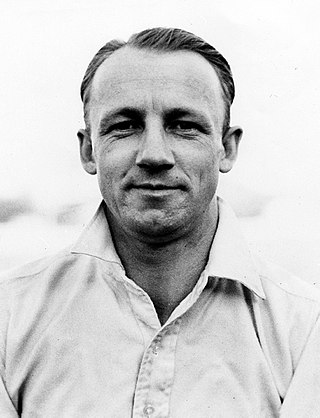
Sir Donald George Bradman, nicknamed "The Don", was an Australian international cricketer, widely acknowledged as the greatest batsman of all time. His cricketing successes have been claimed by Shane Warne, among others, as making Bradman the "greatest sportsperson" in history. Bradman's career Test batting average of 99.94 is considered by some to be the greatest achievement by any sportsman in any major sport.
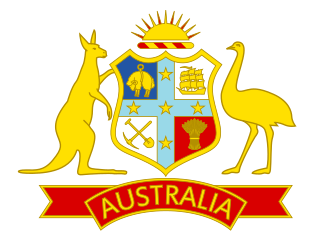
The Australia men's national cricket team represents Australia in men's international cricket. Along with England, it is joint the oldest team in Test cricket history, playing in the first ever Test match in 1877; the team also plays One-Day International (ODI) and Twenty20 International (T20I) cricket, participating in both the first ODI, against England in the 1970–71 season and the first T20I, against New Zealand in the 2004–05 season, winning both games. The team draws its players from teams playing in the Australian domestic competitions – the Sheffield Shield, the Australian domestic limited-overs cricket tournament and the Big Bash League. Australia are the current ICC World Test Championship and ICC Cricket World Cup champions. They are regarded as the most successful cricket team in the history of cricket.

Matthew Lawrence Hayden is an Australian cricket commentator and former cricketer. His career spanned fifteen years. Hayden was a powerful and aggressive left-handed opening batsman who, along with opening partners Justin Langer and Adam Gilchrist, contributed heavily to Australia's success during its "golden era" (2000–2008) in Test and ODI cricket respectively. He holds the record of highest individual score by an Australian batsman in Tests, having scored 380 against Zimbabwe during Zimbabwe's 2003 tour of Australia. This stands as the second-highest individual score in test cricket. It is the highest score by an opening batsman in Tests, though infamously he never faced the opening ball in Tests with Langer, always batting at No2. Hayden was a member of the Australian team that won both the 2003 Cricket World Cup, and the 2007 Cricket World Cup.
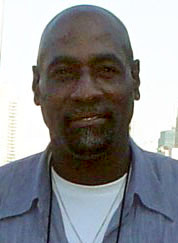
Sir Isaac Vivian Alexander Richards is a retired Antiguan cricketer who represented the West Indies cricket team between 1974 and 1991. Usually batting at number three in a dominant West Indies side, Richards is widely regarded as one of the greatest batsmen of all time. Richards was part of the squads which won the 1975 Cricket World Cup and 1979 Cricket World Cup and finished as runners up in the 1983 Cricket World Cup.

John Michael Brearley is a retired English first-class cricketer who captained Cambridge University, Middlesex, and England. He was the captain of the English squad which finished as runners-up at the 1979 Cricket World Cup.

The South Australia men's cricket team is an Australian men's professional first-class cricket team based in Adelaide, South Australia. South Australia play their home matches at Adelaide Oval and Karen Rolton Oval, they are the state cricket team for South Australia representing the state in the Sheffield Shield competition and the limited overs Marsh One-Day Cup. The team is selected and supported by the South Australian Cricket Association (SACA). Their Marsh One-Day Cup uniform features a red body with black sleeves. They were known as the Southern Redbacks from 1995 to 2024, and officially competed under the West End Redbacks moniker from 1996 to 2024 due to a sponsorship agreement with West End. The Redbacks formerly competed in the now-defunct KFC Twenty20 Big Bash, but were succeeded by the Adelaide Strikers in 2011 because this league was replaced with the Big Bash League.
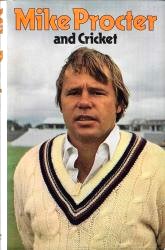
Michael John Procter was a South African cricketer, whose involvement in international cricket was limited by South Africa's banishment from world cricket in the 1970s and 1980s. A fast bowler and hard-hitting batsman, he was regarded as one of South African cricket's top allrounders.

Bowral is the largest town in the Southern Highlands of New South Wales, Australia, about ninety minutes southwest of Sydney. It is the main business and entertainment precinct of the Wingecarribee Shire and Highlands.

Sir Everton DeCourcy Weekes, KCMG, GCM, OBE was a cricketer from Barbados. A right-handed batsman, he was known as one of the hardest hitters in world cricket. Weekes holds the record for the most consecutive Test hundreds, with five. Along with Frank Worrell and Clyde Walcott, he formed what was known as "The Three Ws" of the West Indies cricket team. Weekes played in 48 Test matches for the West Indies cricket team from 1948 to 1958. Weekes occasionally donned the wicketkeeping gloves as well. He continued to play first-class cricket until 1964, surpassing 12,000 first-class runs in his final innings. As a coach he was in charge of the Canadian team at the 1979 Cricket World Cup, and he was also a commentator and international match referee.
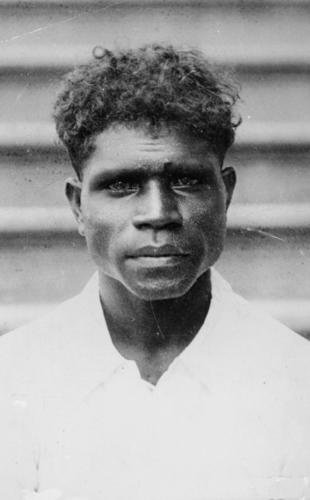
Harold Edward Gilbert, known as Eddie Gilbert, was an Australian Aboriginal cricketer who represented Queensland in the Sheffield Shield. He was described as an exceptionally fast bowler. He competed for Queensland in the Sheffield Shield between 1930 and 1936. Described by Don Bradman as the fastest bowler he ever faced, Bradman said he was “faster than anything seen from Harold Larwood or anyone else.”
Roland John Perry OAM is an Australian author and historian. His work includes three works of fiction and more than twenty documentary films. His book Monash: The Outsider Who Won the War was awarded the Fellowship of Australian Writers' Melbourne University Publishing Award in 2004 and described as "a model of the biographer's art."
Gideon Clifford Jeffrey Davidson Haigh is a British-born Australian journalist and non-fiction author who writes about sport, business and crime in Australia. He was born in London, was raised in Geelong, and lives in Melbourne.
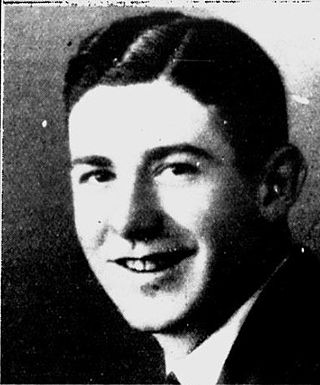
Neville Anthony Quinn was a cricketer who played in 12 Test matches for South Africa from 1929 to 1931–32.
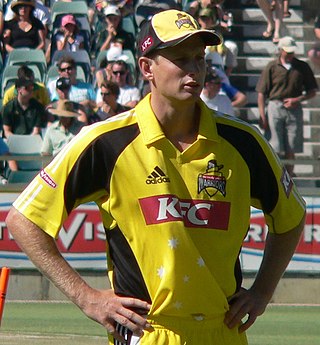
Adam Charles Voges is an Australian cricket coach and former cricketer who played for the Australian national team at Test, One Day International (ODI), and Twenty20 International (T20I) level, and also captained Western Australia and Perth Scorchers in domestic cricket. Voges' Test match batting average of 61.87 is third among batsmen that have played a minimum of 20 innings behind Don Bradman and Harry Brook, who has played exactly 20 innings as of 31 July 2023. Voges was included in the 2016 ICC Test Match Team of the Year.

The appearances of former Australian cricketer Don Bradman in popular culture are many and varied. As a player, he first came to prominence during the 1928/29 season. His record-breaking performances on the 1930 tour of England made him a national hero in Australia. Bradman was a private person who did not enjoy the adulation associated with his fame. In cricket, a batsman who enjoys an exceptional run of form over an extended period is sometimes called Bradmanesque.

Steven Peter Devereux Smith is an Australian international cricketer and former captain of the Australian national team in all three formats of the game. He is regarded as one of the greatest Test batsmen of all time. Smith was a member of the Australian teams that won the 2015 and 2023 Cricket World Cup, the 2021 ICC T20 World Cup, and the 2023 ICC World Test Championship final.
In cricket, a players' batting average is the total number of runs they have scored divided by the number of times they have been out, usually given to two decimal places. Since the number of runs a player scores and how often they get out are primarily measures of their own playing ability, and largely independent of their teammates, batting average is a good metric for an individual player's skill as a batter. The number is also simple to interpret intuitively. If all the batter's innings were completed, this is the average number of runs they score per innings. If they did not complete all their innings, this number is an estimate of the unknown average number of runs they score per innings.

The Bradman Museum & International Cricket Hall of Fame is a permanent cultural exhibition dedicated to the game of cricket and Australian cricketing hero Sir Donald Bradman. The Museum located in the Australian town of Bowral, New South Wales. The exhibition opened in November 2010 in buildings formerly used by the Bradman Museum, which was devoted to the cricketing career of the Australian batsman Sir Donald Bradman. The Bradman Museum opened in 1989. The Hall of Fame incorporated all of the former Bradman Museum's holdings. The Bradman Museum was, and in effect remains, the only museum in Australia dedicated principally to an individual.
Don Bradman (1908–2001) was an Australian cricketer who is widely acknowledged as the greatest batsman of all time.















